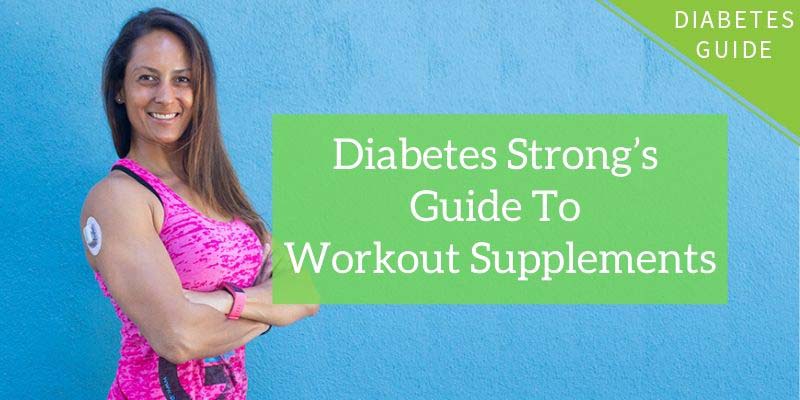This post may contain affiliate links. Please read our disclosure.
When I work with personal training or diabetes coaching clients, one of the questions I am asked most often is “Should I take supplement XYZ?”. To answer some of these questions once and for all, I would like to use this series of posts to go through all the major types of supplements and give my recommendations.
For each supplement type, I will give a brief description of what it is and what it does, whether it has been proven to work or not, if there are any common side effects, and my opinion on if it’s worth using or not.

I am not a bodybuilder, so my recommendations are based on what I think “normal” people, who train to be healthy, gain muscle, lose fat, etc. need. It’s basically a guide to what I would (and do) use myself.
For bodybuilders who want to push their training and bodies to the absolute limit, I can recommend reading some of the supplement guides on Bodybuilding.com.
No matter what supplements you take, ALWAYS follow the directions on the product label. Just because something is marketed as “safe” and “natural”, doesn’t mean you can’t take too much of it and potentially overdose.
Protein Powders
Protein is the building block for muscles and ligaments and is essential for muscle growth. When you work out (lift weights), you actually damage your muscle fibers slightly. After your workout, your body starts repairing the damaged muscle fibers by fusing them together. This process is what makes your muscles both larger and stronger.
To complete this process, your body needs protein. This is why anyone who lifts weights as part of their workout routine should make sure to eat enough protein (you can learn about how much protein to eat in this post).
Optimally, you would get all the protein you need from natural foods like egg whites, chicken, lean beef, and fish, but it can often be hard (and expensive) to get enough protein without also getting too much fat and carbs, so protein powders are a great supplement.
Right after a workout, when you need protein the most, it’s also often easier to just have a quick protein shake than it is to eat a real meal.
The most common protein powders are based on whey (milk protein), a very fast digested protein that is perfect for right after your workout. Whey protein also tends to taste better than soy, casein or egg protein.
Because all the milk sugars have been removed, whey protein is ok to use for people who are lactose intolerant. You can also get plant-based proteins, but I have never tried them.
Who can benefit from protein supplements: Everyone who works out and lifts weights.
Are there any side effects: Not with normal use. If you eat VERY large amounts of protein, it can harm your kidneys, but that shouldn’t be a concern for others than bodybuilders.
What brand do you recommend: We use Met-RX or Isopure for our workout shakes and Met-RX for baking.
Fat Burners
If you are trying to lose weight, the idea of taking a pill that will accelerate your weight loss is of course appealing.
Fat burners generally work by either increasing your metabolism or suppressing your appetite (or both). They usually contain an active ingredient like ephedrine, caffeine, capsaicin (the stuff that gives chilies their burn) or another organic compound that raises body temperature and provides a quick boost of energy.
Research has shown that most fat burners do have an effect, but that it’s very limited. By temporarily increasing your metabolism, the fat burners will help you burn more calories for 1-2 hours, but since they don’t have any effect on your base metabolism, the effect wears off quickly.
The problem with fat burners is that they can have a lot of unwanted side effects. Even relatively safe chemicals like caffeine will increase your heart rate and blood pressure to potentially unsafe levels when taken in large quantities, and a lot of the other ingredients can have serious allergic effects on some people.
Fat burners also have a nasty reputation for containing ingredients not listed on the packaging, like mild steroids (which do work as fat burners but are banned by the FDA because they are known to be harmful to your long-term health).
Who can benefit from fat burners: I don’t recommend fat burners to anyone. The small fat burning effect is not worth the potential side effects
Are there any side effects: Yes. Quite a lot, depending on what’s in the fat burner.
What brand do you recommend: None
Creatine
Creatine is a nitrogenous organic acid produced in the liver that helps supply energy to cells all over the body. Athletes often take creatine because it increases the body’s ability to produce energy quickly, thereby increasing athletic performance.
Creatine doesn’t in itself make you lose weight or gain muscle, but because it enables you to work out harder (do one more rep or lift a little heavier), it’s effective as a muscle-building supplement. Some studies also show that creatine may have a positive effect on memory and even help with depression.
Creatine is one of the few supplements that has been around for a long time and has been thoroughly studied. It’s generally regarded as safe and effective, and not prohibited by any of the major sports associations.
Who can benefit from creatine: Athletes and people trying to gain muscle or improve their sports performance.
Are there any side effects: Very few. The only known side effect is that some people can get mild stomach issues from creatine.
What brand do you recommend: I sometimes use Bodytec’s unflavored creatine powder in my workout protein shakes.
BCAAs (Branched Chain Amino Acids)
Amino Acids are the building blocks of protein and essential for muscle growth and maintenance (branched-chain just refers to their chemical structure).
Your body doesn’t produce BCAAs by itself, so you need to get them from your diet. The main sources of BCAAs are the high-protein foods that are typically part of a healthy fitness diet anyway (chicken, lean beef, eggs, legumes, protein powder, etc.).
Because BCAAs are effective in stimulating protein synthesis in muscles and preventing muscle breakdown, they are used to treat a number of medical conditions related to protein deficiency or muscle and brain failure. They are also given to people who are confined to their beds for extended periods of time to prevent muscle wasting.
Athletes typically use BCAA supplements to increase muscle growth or to maintain muscle mass when dieting to lose weight.
While BCAAs are one of the most popular fitness supplements, there is no scientific consensus that they actually have an effect on healthy people who eat a normal or high-protein diet. In general, it seems like you get enough BCAA through your diet that supplementing has a very limited effect at best.
The strongest (but not conclusive) evidence of a positive effect from BCAA supplements is on people who want to have a very low body fat percentage while retaining large amounts of muscle. It appears likely that supplementing BCAAs may help prevent muscle loss while dieting.
Who can benefit from BCAAs: While the effect of supplementing BCAAs has not been proven conclusively, they are generally safe to take and may have a positive effect. If you are trying to gain muscle mass or retain it while dieting, supplementing your diet with BCAAs is an option. If you are on a budget, skip the BCAAs and buy protein powder and perhaps Creatine instead.
Are there any side effects: The only know (rare) side effect is a slight loss of coordination. Don’t take BCAAs if they make you feel dizzy.
What brand do you recommend: I don’t use BCAAs but I would choose Bodytech if I did.
Glutamine
Glutamine is another amino acid (like the BCAAs) involved in regulating protein synthesis and breakdown. It affects a lot of different functions in your body, including your immune system, metabolism, and water transportation.
While your body produces sufficient glutamine naturally, high-intensity training and weightlifting, combined with a high-protein diet, can lower your glutamine levels. This is why many athletes and bodybuilders take glutamine supplements.
Based on research studies, there is little to suggest that taking glutamine has any effect on muscle gain or weight loss in normal, healthy people. However, there are indicators that athletes and others with very intense workout routines may benefit from supplementing with glutamine, simply because their bodies cannot produce glutamine as quickly as they use it.
Who can benefit from glutamine: Most people don’t benefit from taking glutamine, but if you are a bodybuilder, athlete or hardcore fitness freak, it may be worth considering.
Are there any side effects: There are no known side effects.
What brand do you recommend: I don’t use glutamine, but I would get Bodytech if I did.
Pre-Workouts
“Pre-workouts” is the common term for anything you take just before your workout to boost your energy and stimulate muscle growth.
There are a lot of different pre-workouts on the market, with hundreds of different active ingredients, but they are all designed to make you feel awake and full of energy so you can work out harder.
If that sounds familiar, it’s because the most common ingredient in pre-workouts is a very large dose of caffeine or similar stimulants. Some pre-workouts also contain one or several of the other supplements mentioned in this series (BCAAS, creatine, etc.) in an attempt to provide a total supplement package.
Many pre-workouts also include Beta-Alanine, an amino acid that has the side effect of making your skin tingle so you really “feel the pre-workout working”.
There is no denying that pre-workouts can be effective in providing an energy boost and improving workout performance. In fact, the recommended doses of many products will make many people so jumpy that just sitting down or having a conversation becomes hard.
The downside is that consuming large doses of caffeine or other stimulants can have serious side effects.
The most common side effects are high blood pressure (both immediate and long-term), dangerously increased heart rate, and insomnia. It’s also not uncommon to develop a mild addiction to pre-workouts, where it becomes difficult to work out or even just feel good without using them.
If you decide to use a pre-workout, you NEED to see your doctor first for a health check. There have been well-documented cases where people have died from heart failure after taking pre-workouts, so get your heart checked first.
You should also start with a very small dose (less than half of the recommended dose) the first time to see what happens.
Who can benefit from pre-workouts: Anyone who wants more energy for their workouts, but I DON’T recommend pre-workouts for anyone, due to the side effects. If you need an energy boost, have a strong cup of coffee before your workout.
Are there any side effects: Yes. See above.
What brand do you recommend: I don’t recommend pre-workouts.
There are a lot of other supplements on the market, but the ones I have covered here are the ones I most often get questions about.
If I haven’t included a supplement, it’s a good bet that I wouldn’t recommend you using it 😀




Avi
Is BCCA 2:1:1 safe for diabetic to consume ? Although my sugar level is always in check.
Can I take it during workout?
I did some google and most of them are not in favour.
What would you suggest?
Christel Oerum
For personalized dietary guidance, you’ll have to check with your doctor or dietitian as they’ll know your complete medical history
Juan
What protein powders are safe for a diabetic type 2 to use..I want to gain weight also…
Christel Oerum
Most should be safe for you to consume. I would choose one with limited added carbohydrates, as carbohydrates added to protein powders usually are just plain sugar
Herb
I’ve taken creatine monohydrate in the past and gotten great results from it. However, recently I had surgery on my hand and my blood work showed elevated levels of creatinine. Needless to say my diabetes pharmacist and endocrinologist asked me to stop using it immediately. I know that it will elevate those levels but almost every article I read says that it’s still safe for diabetics. Who am I to believe? Thanks.
Christel Oerum
I would always go with the advice of your medical team. However, it’s ok to ask them why they give that guidance
Shawn
Hi my son is 14 with type 1 he’s been working out with me for about a month now lifting weights he’s doing well so far just says he’s tired well working out I don’t want to start him on any caffeinated drinks before his workout are there any juices you can recommen or natural ways to boost his energy.
Christel Oerum
If he doesn’t feel like he has the energy for the workout I would consider a pre-workout meal/snack consisting of carbs and protein.
chandan kumar
yes mixture of beetroot,mint,ginger and lime juice will be best alternative